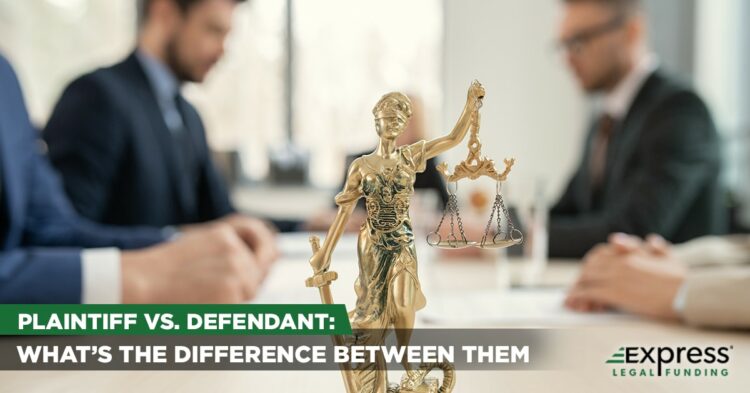
The phrases “sue me” or “sue you” are often said as part of a joke rather than to be legal challenges or threats. Still, suing and lawsuits are no joking matter in the eyes of the law.
Lawsuits have become remarkably common in modern American society to resolve conflicts and ensure that certain parties are held accountable for their actions.
Lawsuits can be highly complex. The laws that can apply to a case can be very diverse due to the sheer number of legal fields attorneys can specialize in.
The legal world requires advanced knowledge to navigate a lawsuit successfully, and legal professionals tend to be the experts with the knowledge needed to understand the finer points of the law.
Nevertheless, there is legal information about how lawsuits work that can be understood by the average person and is essential to those in the middle of these legal battles.
One of the most critical details for any lawsuit type is understanding the difference between the two of the most common legal terms.
Two legal terms are always involved when a lawsuit is underway: plaintiff and defendant. The terms are nouns, which are ubiquitous and significant in court case proceedings.
Plaintiff and defendant each serve as one-word methods to distinguish the parties in a lawsuit. While you might have heard the terms out of context, you might not know what they mean.
The definitions for these terms are simple, yet they still need to be understood and defined for a claim to be filed.
If you have never been involved in legal proceedings, there is a good chance you will not know the significance and differences between plaintiffs vs defendants. Fortunately, learning their meaning is manageable, which we will cover for you in this FAQ and video resource.
What is the Difference Between a Plaintiff and a Defendant? [Video]
What is a Plaintiff?
The term plaintiff is likely one you have heard at least once, even if it was out of context. The plaintiff is the party who brings a legal claim against another person or organization for damages.
A plaintiff is one of the most important parties in a lawsuit, as they are essentially the challenger claiming another’s wrongdoing.
While plaintiffs are essential to lawsuits, they do not apply to every type of legal proceeding, but most involve a plaintiff filing a claim.
The plaintiff files the suit and brings their concerns to court and even stand trial should their case go that far. Without a plaintiff, lawsuits cannot exist since no one is actively suing.
What is the Etymology of Plaintiff?
The term “plaintiff” has been traced back as far as 1278 and originates from Anglo-French terminology. The original word, “pleintif,” means “complaining” or “complainant.”
Still today, the plaintiff is the party filing a complaint about the actions of another person or entity.
While the term originates in classic English and French, it is not used worldwide in multiple English-speaking countries. England and Wales, for example, use the term “claimant” rather than “plaintiff” despite their contribution to the latter’s etymology.
In Scotland, the term “plaintiff” is replaced by the term “pursuer.”
What is Plaintiff Plural?
The plural form of plaintiff is plaintiffs, which includes the plural suffix –s.
In contrast, the possessive form of plaintiff is plaintiff’s, which includes the possessive ‘s (apostrophe + s) indicating ownership of something (i.e., the plaintiff’s case).

Plaintiffs File Lawsuits to Sue Another Party
Regardless of the term used by certain countries, the ultimate meaning and concept remain the same. They all represent a person or entity bringing a case against another party.
Depending on the type of case, the plaintiff is not always a private citizen or company. Instead, it could be a government entity acting on behalf of a state’s or country’s citizens.
We will discuss this later, but keep this idea in mind as we focus on a plaintiff’s motivations for bringing lawsuits. Lawsuits plaintiffs can include factors that don’t have private citizens or commercial entities suing for money.
Now that we defined what a plaintiff is we need to look at the other side of the courtroom and focus on the meaning and definition of “defendant.”
What is a Defendant?
Like “plaintiff,” you have almost certainly heard the term “defendant,” even if you were unaware of its significance. The defendant in a lawsuit is the polar opposite of the plaintiff.
The defendant serves as the title for the person or entity being sued and is just as crucial to lawsuits as the plaintiff since they are the party with whom the plaintiff has a grievance and is making a claim.
The Defendant Gets Sued by the Plaintiff
For defendants, the severity they face for a successful lawsuit varies depending on the type of case being presented. But the one constant factor is the defendant is the party being sued.
When it comes to civil lawsuits, the plaintiff often sues the defendant for damages caused by their negligent actions. Not out of punishment but rather to recover the losses incurred by the defendant’s wrongdoing or tort.
What is the Etymology of Defendant?
The term “defendant” has been traced back as far as 1400 and originates in Anglo-French linguistics. Although now part of the English language, the word “defendant” is Old French, with Modern French having updated the word as “défendant.”
The primary origin of the term lies in the word “defendre,” which is Old French for “defend,” with Latin being the origin of the Old French version of the term defendant.
While not an overly complicated etymological origin, it is still essential to understand how far back the concept of defending oneself against legal claims can be traced (That era is thousands of years ago in human history).

Like “plaintiff,” the exact term used by England, Wales, and Scotland varies compared to America and France. Unlike “plaintiff,” the alternate terms used by these countries depend on the case type.
Now that we understand the distinction between plaintiffs and defendants, we must consider how the type of case affects these definitions.
Similar to plaintiffs, a defendant is not necessarily a private citizen and can be a corporate entity that has wronged private citizens or another company in some way.
When a plaintiff brings a claim against commercial entities, like large public companies, they become defendants in the traditional sense. However, companies often have a larger legal team defending them than a private citizen would.
What is Defendant Plural?
The plural form of defendant is defendants, which includes the plural suffix –s.
In contrast, the possessive form of defendant is defendant’s, which includes the possessive ‘s (apostrophe + s) indicating ownership of something (i.e., the defendant’s jury trial).
What is a Civil Lawsuit?
Civil lawsuits are one of the most common legal proceedings in the country and serve as a tool for private citizens and companies to settle grievances that have cost them a loss in some way.
Who is the Plaintiff in a Civil Case?
A plaintiff is the party that files a civil claim to recover damages inflicted on them, the plaintiff, by the defendant and can cover various types of torts and wrongdoing. Civil lawsuits are so named because they are common law conflicts where the defendant did not necessarily break the law. Still, one party is suing the other due to their alleged suffering due to another party’s negligence.
For example, family law cases like child support, ADA lawsuits and accessibility cases, breach of contract, and so on do not always involve a criminal element. Yet they still merit the plaintiff filing a claim.
However, the question of how the definitions of “plaintiff” and “defendant” are altered by civil law remains.

Plaintiff vs. Defendant in Civil Law Cases
Ultimately, the definitions of differences between a plaintiff and a defendant remain the same in civil court, but civil claims affect who serves as the plaintiff and the defendant.
Generally, the plaintiff in a civil lawsuit is a private citizen, but situations happen, so it is not rare for a corporate entity to file a claim as the plaintiff in civil court.
Who is the Defendant in a Civil Case?
The defendant in a civil claim is either a private citizen or a corporate entity alleged to have caused harm to the plaintiff.
For example, let us say that the plaintiff was driving to work and stopped at a red light. While waiting for the light to change, the defendant, who is not paying attention, rear-ends the plaintiff, damages their vehicle, and causes them bodily harm. Car accident cases are civil lawsuits.
If the defendant is a private citizen, the civil claim would involve the plaintiff directly filing a lawsuit against the defendant. If they are found to be at fault, the defendant is then held accountable by a court order for the damage and injuries owed to the plaintiff.
This situation is an example of a civil case where private citizens are the plaintiff and defendant. The story changes if the defendant operated a company vehicle while actively working for their employer.
Let us say that the defendant works as a delivery driver for a flower company and operates a company van to make their daily deliveries.
Because the driver was actively on duty and running a company vehicle when the plaintiff was crashed into, the plaintiff would file a claim against the driver’s employer.
As a result, the flower company becomes the defendant and internally deals with the negligent employee. There is one more possible variation on how civil claims work.
Can a Business be a Plaintiff?
Yes, a business corporation can be the plaintiff if they were the victim of someone else’s actions.
For example, let us say that a food manufacturer discovers that an article was posted online claiming their food is full of harmful toxins and giving people food poisoning despite their products and merchandise passing all safety requirements.
The manufacturer can file a civil claim against the people responsible for the article on the grounds of libel and defamation.
Company as the Plaintiff in Defamation Lawsuit
In this scenario, the food manufacturer becomes the plaintiff, while the article’s author and the website that posted it could be the defendants.
Similarly, plaintiffs can file civil cases against defendants for defamation involving false speech rather than words, known as slander.
Civil lawsuits don’t immediately end up in a courtroom for the defendants to stand trial. Other steps will come first, no matter the situation.
One step that leads up to a court date is for the defendants being sued in a civil case to be served a notice of the lawsuit by a process server.
Additionally, a filing of an Affidavit, which is considered a form of testimony that is done outside the courtroom, is often a crucial first step to getting a hearing or a court order for a deposition to take place.
The above steps commonly take place before a civil case starts in court, but there can also be options after a court decision is made.
Appellant versus Appellee Definitions
Because double jeopardy is not a factor in civil suits, both the plaintiff and not just the defendant can become what is known as an appellant if they are unhappy with the court’s decision.
The appellant who wants to appeal a civil court’s decision is also commonly referred to as the “petitioner.” On the opposite side of the appellant is the appellee.
The appellee is the party that won the original civil lawsuit, so they want the original court decision to stand and not be reversed. The appellee is often referred to as the “respondent.”
When a court case is lost, or the petitioner has issues with the trial, the losing side can appeal to a higher court to review the lower court’s decision. This is common with massive settlement amounts awarded by juries in cases against big corporations.
The higher court may reduce the settlement amount, so the petitioner only has to pay the plaintiffs a much lower lump sum settlement.
Civil claims are expansive and cover several other situations in modern society, but the plaintiff and defendant are constants.
Unfortunately, civil lawsuits are far from the only legal proceedings that must take place, as another type of case can have much more significant implications for American citizens and companies.
This other type of legal action brought through the justice system has more severe consequences and intriguingly affects the plaintiff’s identity and expands the meaning of who a plaintiff can be.

What is a Criminal Case?
Criminal lawsuits are an equally common type of legal case, though they are far more upsetting and will almost always have the potential to upend the defendant’s future more than than civil claims typically do.
A criminal lawsuit is filed only when the defendant is charged with violating a criminal law, most often a federal law.
Criminal defendants are never in a good legal position. However, most criminal defendants are usually placed in a more precarious position that can involve possible jail time since most criminal offenses that make it to court involve severe injury or loss of life.
They are from being “victimless crimes,” as you can put a face a name to the victims of their alleged crimes.
Not to mention some of the exact felony charges in the law books a criminal defendant might face are enough to make anyone turn pale as a ghost.
Defendant vs. Plaintiff in a Criminal Lawsuit
The main similarity between criminal and civil lawsuits is that there is still a plaintiff and a defendant. However, there is a difference concerning who the plaintiff is in criminal cases.
Who is the Defendant in a Criminal Case?
Criminal defendants are usually private citizens rather than corporate entities, though it is from being unheard of and entirely possible for a corporate entity to violate criminal laws.
Typically, most criminal offenses include severe crimes like murder, rape, theft and robbery, assault and battery, driving under the influence, and intentional property damage.
Numerous lesser criminal charges exist, but these are among the worst possible crimes a criminal defendant can commit and carry the most significant penalties.
It is also why, although far from perfect, our judicial system is built on the concept of “innocent until proven guilty” since there are instances where a defendant is falsely accused and where there is reasonable doubt.
What is the Burden of Proof in Criminal Cases?
Some measures to protect defendants include the prosecutor (the plaintiff) having the burden of proof and not the other way around being the most prominent one. What this crucial distinction means is that it is the job of the prosecutor in criminal cases to prove the defendant is guilty instead of the defendant having to prove they are, in fact, innocent.
There is also the statute of limitations in criminal cases, where a lawsuit cannot be filed after a certain amount of time after the event; both criminal and civil cases have statutes of limitations.
While wrongful death lawsuits can be filed against murderers, these claims fall under the civil claim category and are not criminal proceedings.
When a defendant loses a criminal case and is found guilty, they will face punishment to pay their debt to society and be a reason to discourage the crime in the first place.
Who is the Plaintiff in a Criminal Case?
Unlike civil cases, the plaintiff in a criminal suit is never a private or corporate entity. Instead, for criminal cases, the plaintiff is the government that files on the people’s behalf. The government entity files a lawsuit against the defendant being accused of the crimes.
Plaintiff vs Prosecutor
The US government or state government act as the plaintiff against the defendant. The prosecuting attorney (prosecutor) has the goal in mind to successfully build and prosecute the case against the alleged perpetrator of the crime so they can get punished for their actions.

For an example of a criminal case, let us say that a man breaks into his neighbor’s home and murders them in cold blood. Regardless of the motivation or pleadings, the man executing a fellow citizen is a capital offense that mandates severe punishment.
Depending on the charges, if the man is found guilty of a felony, he might be facing life in prison.
Of course, even the most open and shut cases are never straightforward for even the best prosecuting attorney. A district prosecutor and the police will attempt the successful prosecution through supporting evidence like fingerprints and forensics.
In the 1900s, capital punishment was practiced much more regularly in many states across the country than it is today. Unfortunately, people who were wrongfully convicted were also put wrongly to death.
What states have the death penalty in 2023? Since 1976 when the Supreme Court reinstated the right for states to impose the death penalty, only 27 states have laws allowing their state courts to sentence criminals to death for committing a capital crime. The states that allow for the death penalty include:
Death Penalty States List in 2023
- Alabama
- Arizona
- Arkansas
- California
- Florida
- Georgia
- Idaho
- Indiana
- Kansas
- Kentucky
- Mississippi
- Missouri
- Montana
- Nebraska
- Nevada
- North Carolina
- Ohio
- Oklahoma
- Oregon
- Pennsylvania
- South Carolina
- South Dakota
- Tennessee
- Texas
- Utah
- Wyoming
If the criminal case is in one of these 27 states, the defendant can face the death penalty rather than a life sentence depending on the exact charges.
No criminal case has a citizen or company as the plaintiff under any circumstances since only government officials can punish criminal action.
Regardless, the government is represented by the district attorney (DA), who represents the state’s interests in criminal proceedings. They file the claim with the intent that the defendant, an alleged criminal, faces punishment for their accused crimes.
Wrongful death civil claims filed by the victim’s family are the only option for family members seeking compensation from a defendant for the murder and cause of their loved one’s death.
This phenomenon marks the ultimate distinction between plaintiffs and defendants and serves as the apex of legal proceedings.
Even with the severe nature of criminal trials and their punishments, civil procedures are more common than criminal suits.
Now for one last question: How Are Court Cases Named?
“Plaintiff vs. Defendant” is Used For the Case Name
For both civil and criminal lawsuits, the case name is determined by naming based on who the plaintiffs and defendants are in the claim. The first name is the plaintiff and the second name is the defendant.
So it has the following format: Plaintiff v. Defendant. For federal criminal cases, it can be United States v. Defendant.
The naming scheme keeps it uniform and makes it easier to know who the plaintiff and defendant are in a court case from only the name.
Closing Statements on Who Are the Plaintiffs and Defendants
Whether civil or criminal offenses, plaintiffs and defendants are the two parties in a lawsuit. Plaintiffs and defendants are the driving force behind claims and counterclaims, as there is no case to pursue or trial to hear without them.
While not every legal proceeding is a lawsuit, those lawsuits require a damaged party with losses and a party alleged to be responsible for those damages.
Understanding the difference between the two sides of a case helps ensure you remain knowledgeable about how lawsuits function on the most fundamental level.
Despite that, there is another concern for those serving as plaintiffs in a civil claim.

A personal injury case is one of the most common types of civil lawsuits. Injured plaintiffs still have to pay their daily living costs and medical expenses regardless of whether another party was at fault.
Even forgetting the legal advice and their paying for it via a contingency-based attorney’s fee, their costs are likely going up and not down.
So this reality can put many plaintiffs in a financial bind when filing a civil lawsuit as they take time to be settled or won.
Fortunately, we at Express Legal Funding, a Plano, Texas-based company, can offer qualifying civil case plaintiffs a financial solution to use in the meantime.
So they can get cash to pay their bills when they need it and don’t have to wait for the civil lawsuit defendant to pay up.
The financial service we can provide you is called pre-settlement funding, and it is an advance on potential settlement or trial award in civil lawsuits like personal injury or car accident claims.
Plaintiffs can use these funds to pay for essential services like power or housing while they wait for their cases to be settled or won.
Pre-settlement Funding is for Plaintiffs and Not Defendants
The only thing they can’t use it for is paying their attorney or for the costs of the case itself.
How it works in most states, since it is not a loan of any type, is that we, as a legal funding company, can offer you the non-recourse funds in exchange for a share of your potential case proceeds.
(In some states, the money must be advanced as a recourse loan. Therefore it is not risk-free and must technically be repaid regardless of the case outcome.)
You are only responsible for ensuring your law firm is aware of the funding so we get repaid via your law firm sending out the money from your settlement funds check at the end of your case.
The best part about it being non-recourse funding and not a loan is if you end up losing and not recovering any money from your claim, you owe no money back to us, and the funding is yours to keep.
That is what makes it risk-free for you, plaintiff. So, if you are a plaintiff in a pending civil lawsuit and need help financially, as your potential settlement or court award can’t come soon enough, give us a call today.
We are happy to help you learn more about pre-settlement funding and to better understand how it can be an excellent finance option for you and your situation.
Most of all, after reading this article, regardless of whether you need legal funding, we hope you found this a valuable resource to know more about what a plaintiff vs. a defendant is and the differences between them.

